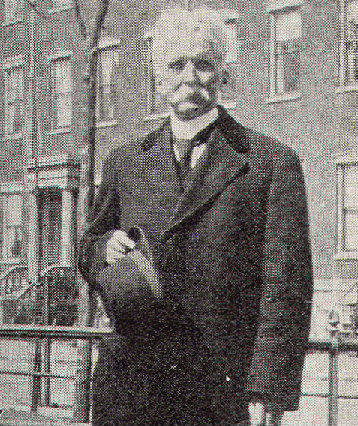Introduction
This ancient parable was first recorded in the fourth century B.C. in Xenophon’s Memorabilia, an account of the teachings of Socrates. In the story, Hercules, the half-mortal son of the god Zeus, is confronted by two beautiful women—virtue and vice—and forced to choose which path he will pursue.
This modern adaptation is by James Baldwin (1841–1925), who included it in a reader for schoolchildren, Hero Tales Told in School (1904). Baldwin, a lifelong educator, wrote or edited more than fifty books for use in schools. Why does Hercules choose as he does? What persuaded him to do so? Is there, in your view, a close connection between Labor and Virtue? Is it really true that “there is nothing worth having that must not be won by toil”? Which road will you choose, and why?
When Hercules was a fair-faced youth, and life was all before him, he went out one morning to do an errand for his stepfather. But as he walked his heart was full of bitter thoughts; and he murmured because others no better than himself were living in ease and pleasure, while for him there was naught but a life of labor and pain.
As he thought upon these things, he came to a place where two roads met; and he stopped, not certain which one to take.
The road on his right was hilly and rough; there was no beauty in it or about it: but he saw that it led straight toward the blue mountains in the far distance.
The road on his left was broad and smooth, with shade trees on either side, where sang an innumerable choir of birds; and it went winding among green meadows, where bloomed countless flowers: but it ended in fog and mist long before it reached the wonderful blue mountains in the distance.
While the lad stood in doubt as to these roads, he saw two fair women coming toward him, each on a different road. The one who came by the flowery way reached him first, and Hercules saw that she was as beautiful as a summer day.
Her cheeks were red, her eyes sparkled; she, spoke warm, persuasive words. “O noble youth,” she said, “be no longer bowed down with labor and sore trials, but come and follow me, I will lead you into pleasant paths, where there are no storms to disturb and no troubles to annoy. You shall live in ease, with one unending round of music and mirth; and you shall not want for anything that makes life joyous—sparkling wine, or soft couches, or rich robes, or the loving eyes of beautiful maidens. Come with me, and life shall be to you a day-dream of gladness.”
By this time the other fair woman had drawn near, and she now spoke to the lad. “I have nothing to promise you,” said she, “save that which you shall win with your own strength. The road upon which I would lead you is uneven and hard, and climbs many a hill, and descends into many a valley and quagmire. The views which you will sometimes get from the hilltops are grand and glorious, but the deep valleys are dark, and the ascent from them is toilsome. Nevertheless, the road leads to the blue mountains of endless fame, which you see far away on the horizon. They cannot be reached without labor; in fact, there is nothing worth having that must not be won by toil. If you would have fruits and flowers, you must plant them and care for them; if you would gain the love of your fellow men, you must love them and suffer for them; if you would enjoy the favor of Heaven, you must make yourself worthy of that favor; if you would have eternal fame, you must not scorn the hard road that leads to it.”
Then Hercules saw that this lady, although she was as beautiful as the other, had a countenance pure and gentle, like the sky on a balmy morning in May.
“What is your name?” he asked.
“Some call me Labor,” she answered, “but others know me as Virtue.”
Then he turned to the first lady. “And what is your name?” he asked.
“Some call me Pleasure,” she said, with a bewitching smile, “but I choose to be known as the Joyous and Happy One.”
“Virtue,” said Hercules, “I will take thee as my guide! The road of labor and honest effort shall be mine, and my heart shall no longer cherish bitterness or discontent.”
And he put his hand into that of Virtue, and entered with her upon the straight and forbidding road which leads to the fair blue mountains on the pale and distant horizon.
Return to The Meaning of Labor Day.


 (6 votes, average: 4.00 out of 5)
(6 votes, average: 4.00 out of 5)
Post a Comment